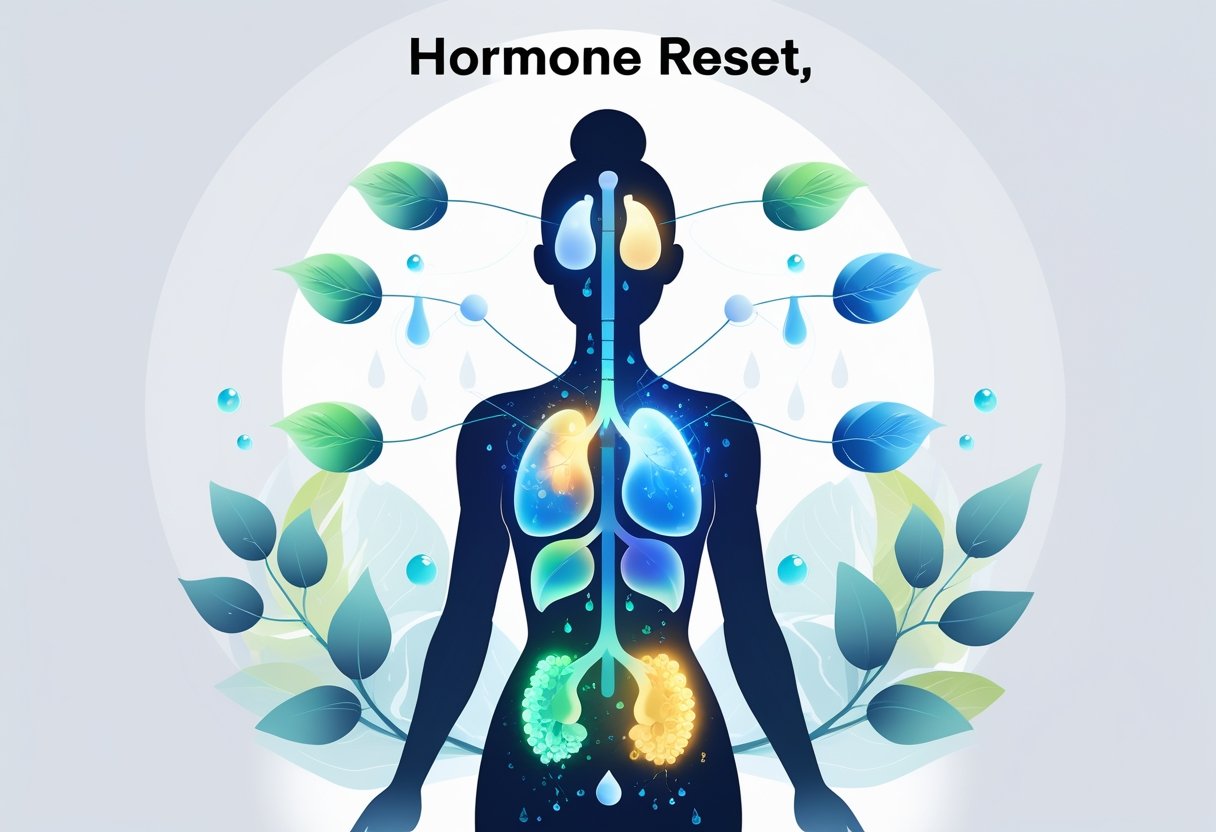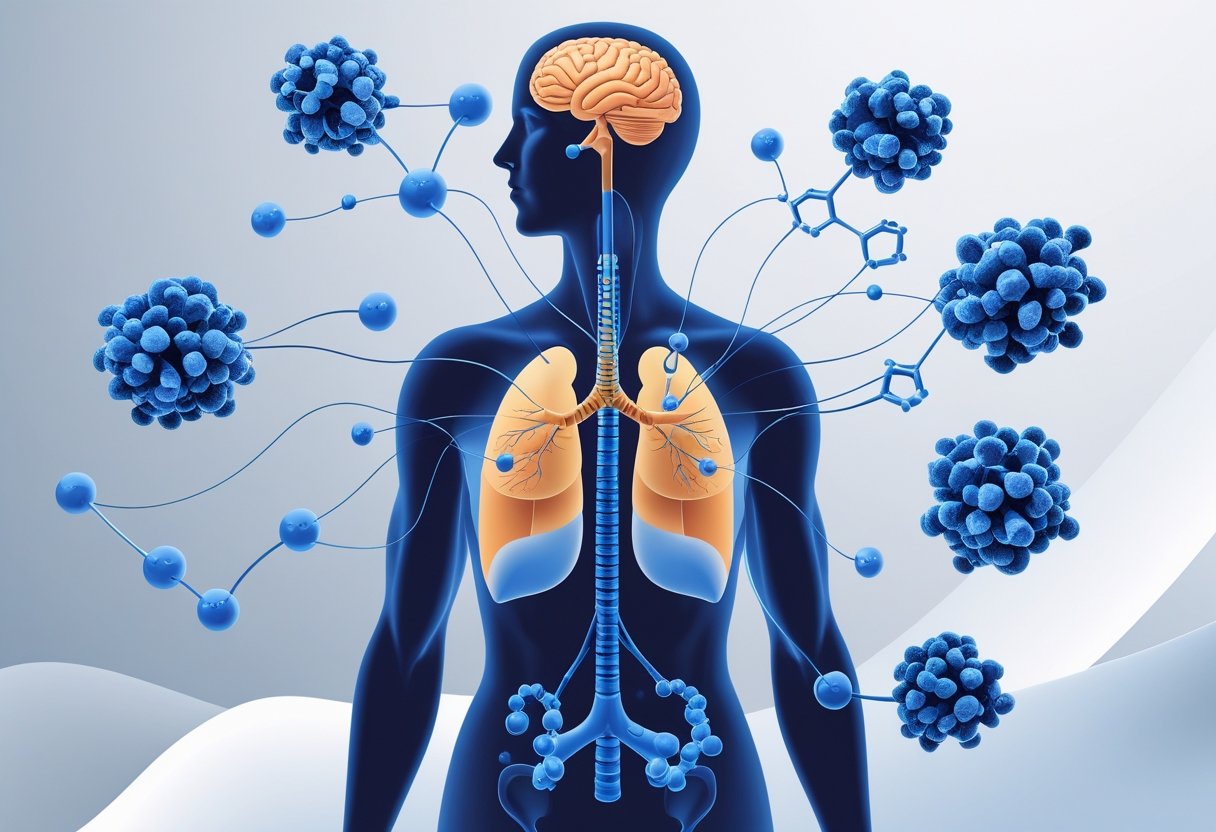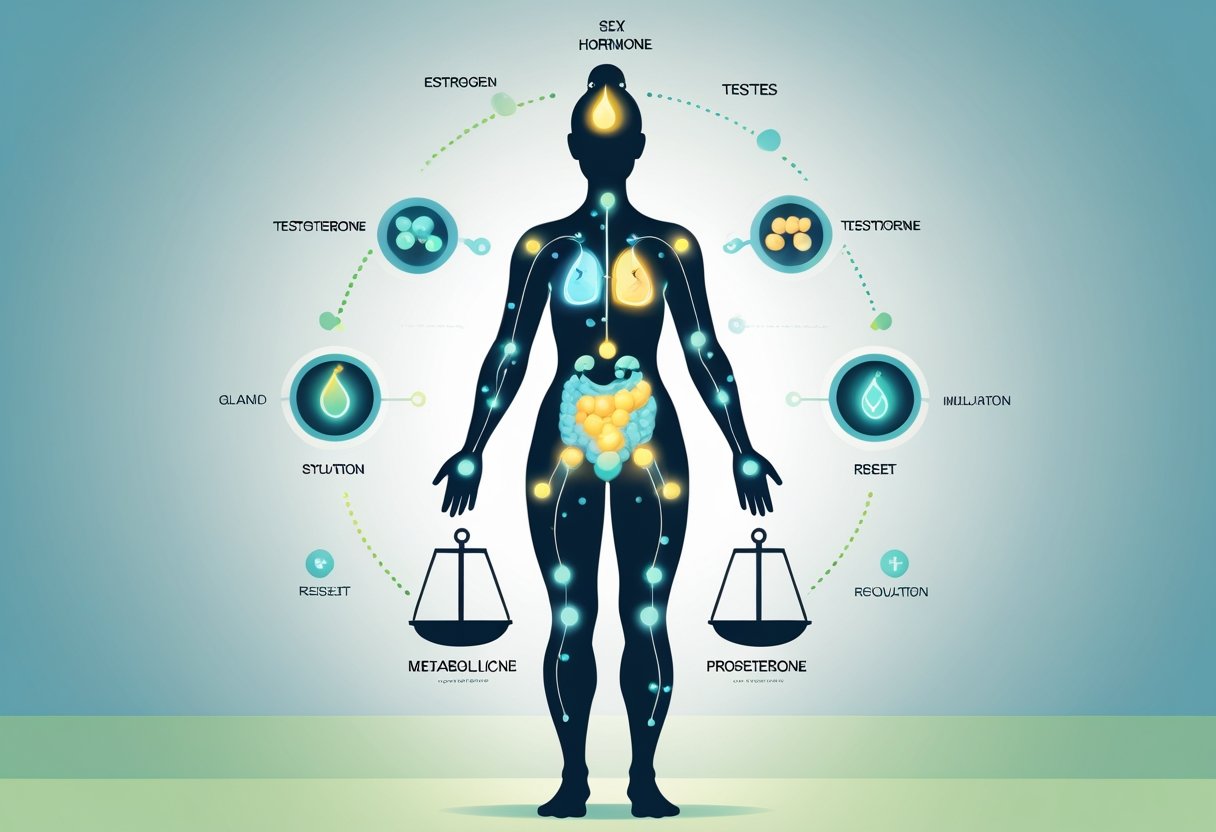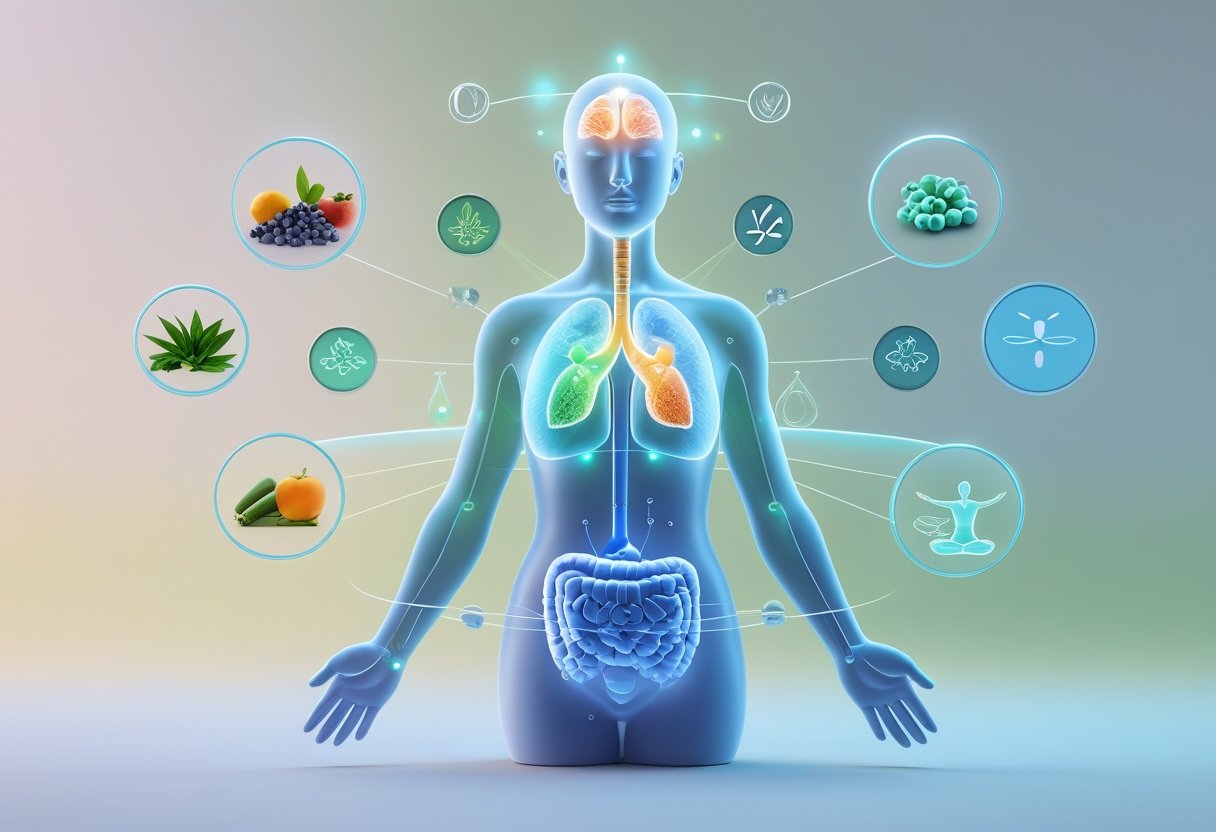Many people struggle with issues like stubborn weight gain, fatigue, and trouble sleeping, but don’t realize that their hormones might be the reason.
Hormone reset methods use diet, exercise, and lifestyle changes to target hormone balance, which can help improve metabolism and boost overall wellness. This approach often focuses on key hormones linked to appetite, aging, metabolism, and energy levels.

Popular plans like the Hormone Reset Diet recommend short-term changes such as eliminating certain foods to help address hormonal imbalances. Many people find success by combining these dietary changes with regular exercise and habits that support healthy hormone levels.
Key Takeaways
- Hormone reset aims to improve hormone balance and metabolism.
- Effective plans use diet, exercise, and daily habits for results.
- Short-term changes may lead to long-term health improvements.
Understanding Hormones and Metabolism
Hormones are natural chemicals made by glands in the body. Metabolic hormones help control how food is turned into energy, how fat is stored, and how hungry or full someone feels.
Roles of Metabolic Hormones
Metabolic hormones include insulin, leptin, ghrelin, thyroid hormones, and cortisol. Each of these affects different parts of the body’s energy use and storage.
For example, insulin helps move sugar from blood into cells, while leptin tells the brain when the body has enough fat. Ghrelin increases hunger before meals, and thyroid hormones speed up or slow down how fast the body uses energy. Cortisol, a stress hormone, can signal the body to store more fat, especially during stressful times.
These hormones work by attaching to special spots called hormone receptors on cells. If the body does not respond to these hormones in the right way, it can affect how much energy gets used or stored as fat. Some health issues, like obesity and diabetes, are linked to problems with metabolic hormones.
How Hormones Influence Metabolism
Hormones shape metabolism by controlling appetite, energy use, and fat storage. For example, after someone eats, insulin helps lower blood sugar by letting cells take in sugar for energy or storage. If the body doesn’t use insulin well, blood sugar rises and more fat may be stored.
Thyroid hormones are important for how fast or slow metabolism works. If thyroid hormone levels are low, the body uses less energy and weight can increase. High thyroid levels can have the opposite effect.
Leptin and ghrelin impact hunger. Leptin lowers appetite, while ghrelin boosts it. When these hormones are out of balance, it can lead to overeating or trouble losing weight. Learn more about how hormones are connected to weight and metabolism from trusted health sources like Verywell Fit and Healthline.
What Is Hormone Reset?
Hormone Reset is a term used for an eating plan and lifestyle approach designed to support hormone balance in the body. It commonly includes changes in diet and daily habits that may help regulate metabolism and support weight loss.
Principles of Hormone Reset
The main principle behind hormone reset is to identify and remove foods and activities that might disrupt hormone levels. Common steps in these plans include eliminating foods such as sugar, processed grains, dairy, and alcohol for a set period, often about three weeks.
These changes are thought to reduce inflammation and limit factors that could interfere with hormones like insulin, estrogen, and cortisol. The program may also guide people to focus on eating whole foods, such as vegetables, lean proteins, and healthy fats.
Exercise and stress management are also encouraged because both can affect hormone levels. The goal is hormonal optimization through lifestyle, not just diet.
Some plans, like the Hormone Reset Diet, follow a structured process. This can include weekly phases where certain foods are taken out or added back in slowly. The steps are meant to help people find out which foods and actions work best for their own hormonal health.
Benefits of Hormone Reset
Supporters suggest that hormone reset can lead to more stable energy, easier weight loss, and fewer cravings. Many people report better sleep, mood, and less brain fog with these changes.
These benefits are believed to happen because hormone balance helps control appetite, metabolism, and fat storage. For example, lowering sugar can improve insulin response, which is important for weight and energy. Reducing processed foods may also reduce bloating and help people feel lighter.
An energy program like hormone reset often encourages regular movement and stress relief as part of the plan. This can further support hormone function and may help people feel more refreshed.
It is important to know that results can vary and not all claims are proven by strong research. Some may see big changes, while others may not notice a difference. Always check with a healthcare provider before starting a new diet or lifestyle plan, especially if you have a medical condition.
Common Hormonal Imbalances
Hormones such as insulin, thyroid hormones, and sex hormones control many important body processes. When these hormones become unbalanced, it can lead to weight gain, illness, or changes in health as people age.
Identifying Symptoms
Hormonal imbalances cause a variety of symptoms. People may notice sudden weight gain or weight loss. Other signs include changes in energy, trouble sleeping, acne, or mood swings. Some experience low sex drive or more frequent headaches.
Younger people may have problems with growth. Women may have irregular periods or trouble getting pregnant. Men may notice loss of muscle or hair thinning. These changes often develop slowly but can sometimes happen quickly.
Anyone who has several of these symptoms should consider seeing a doctor. It is important to catch these problems early, especially if there is a risk of a health condition related to hormones. For more examples of symptoms, see this list from UCLA Health.
Causes of Hormonal Imbalance
Hormonal imbalance can happen for many reasons, including illness, obesity, and aging. Some people develop hormone resistance, meaning their body does not respond correctly to hormones like insulin, which can lead to diabetes.
Common causes include disorders of the thyroid, adrenal glands, or pituitary gland. Poor diet, lack of exercise, stress, and certain medications may also disturb hormone levels. Women may notice changes during puberty, pregnancy, or menopause. Men can be affected as testosterone levels drop with age.
Chronic illness can further complicate hormone balance. Managing weight and reducing stress help lower the risk of developing these issues, as explained by Cleveland Clinic. Healthy lifestyle choices play a key role in keeping hormones balanced.
Key Hormones in Hormone Reset

Two important hormones that influence weight, energy, and health are cortisol and thyroid hormones. Each plays a different role in the body’s metabolism and stress response.
Cortisol and Stress Response
Cortisol is often called the “stress hormone.” It is produced by the adrenal glands and helps the body manage stress. When someone is under chronic stress, their cortisol levels can stay high for long periods.
High cortisol can affect the body's metabolism and increase belly fat. It does this by signaling the body to store more energy as fat, especially around the abdomen. Chronic stress can also disrupt the balance of other hormones, like insulin and estrogen.
Cortisol works by binding to glucocorticoid receptors found throughout the body. These receptors help control how the body uses sugar and fat. Too much cortisol stimulation can lead to problems with blood sugar levels, sleep patterns, and weight gain. Managing stress through sleep, relaxation, and exercise can help maintain healthy cortisol levels. Read more about cortisol’s role in hormonal balance.
Thyroid Function and Metabolism
The thyroid gland makes hormones that are essential for energy use, metabolism, and temperature control. The main thyroid hormones—T3 and T4—help cells use energy correctly. These hormones act by binding to thyroid receptors inside many cells.
If thyroid hormones are too low, a person may feel tired, cold, or notice weight gain. High levels can cause weight loss, sweating, and anxiety. Problems with thyroid function can slow or speed up a person's metabolism.
The body’s metabolism adjusts based on signals from the thyroid. If the thyroid isn’t working well, it can affect almost every organ and process in the body. Supporting thyroid health involves getting enough iodine, selenium, and regular checkups. For more details on how the thyroid influences metabolism and weight, visit this overview of hormone diets and thyroid health.
Sex Hormones and Weight Regulation

Sex hormones play a major part in how the body stores fat, controls appetite, and builds muscle. Estrogen and testosterone changes can affect weight gain, fat distribution, and muscle growth at different ages and stages of life.
Estrogen and Weight Balance
Estrogen helps control how fat is stored and where it goes on the body. During a woman’s reproductive years, higher estrogen levels often support a healthy balance between lean body mass and fat storage. When estrogen levels drop during menopause, body fat may shift from the hips and thighs to the stomach.
Sudden drops or long-term low estrogen can slow down metabolism. This makes it easier to gain weight and harder to lose it. Changes in estrogen also change how the body responds to progesterone receptors, which may affect appetite and mood. Eating balanced meals, exercising regularly, and talking to a doctor are useful ways of re-balancing estrogen to help manage weight.
Testosterone and Muscle Mass
Testosterone is mostly known as a male hormone, but women have small amounts too. It plays a key role in building and keeping muscle mass. More muscle means the body burns more calories, even at rest. When testosterone is low, both men and women may find it easier to gain fat and lose muscle tone.
Low testosterone may lower energy and make it harder to stay active. Raising testosterone naturally, with regular strength training and a healthy diet, can help the body keep more lean muscle. This helps with controlling weight and managing body fat. Regular checks of hormone levels with a healthcare provider can help spot and address testosterone changes early.
Insulin, Leptin, and Appetite Control
Insulin and leptin are key hormones that help manage hunger, fullness, and weight. Changes in how the body responds to these hormones can lead to blood sugar problems or weight gain.
Insulin Resistance and Blood Sugar
Insulin moves sugar from the blood into the body’s cells to use as energy. When cells stop responding to insulin properly, it is called insulin resistance. This leads to higher blood sugar. People who have high blood sugar for a long time risk developing type 2 diabetes.
Insulin resistance often comes from eating too many processed foods, having extra body fat, or not moving enough. Over time, the pancreas makes more insulin, but the cells still do not respond well. This can cause more hunger and cravings, even after eating.
Warning signs for insulin resistance can include feeling tired often, fast weight gain, or finding it hard to lose weight. Managing carb intake, eating more fiber, and staying active can help the body respond better to insulin.
Leptin and Satiety Signals
Leptin is made by fat cells and tells the brain when the body has enough stored energy. When leptin works well, it helps stop overeating by signaling fullness to the brain’s appetite center. For some people with extra body fat, leptin does not send strong signals anymore. This issue is called leptin resistance.
Leptin resistance can increase appetite while making weight loss difficult. The brain does not get the “full” message clearly, so a person may keep feeling hungry. This is common in people who have obesity or unhealthy eating patterns.
Healthy habits—such as getting enough sleep, managing stress, and avoiding processed foods—can improve leptin sensitivity. These steps help the body recognize natural signals for hunger and fullness, which supports keeping a healthy weight. Learn more about how leptin affects weight and appetite and the link between leptin and the urge to eat.
Growth Hormone and Aging
Growth hormone is a protein that helps control growth, metabolism, muscle strength, and body composition. It is highest when people are young, supporting physical development and growth.
Levels of growth hormone start to decrease soon after a person finishes puberty. By middle age, most people have much lower levels than when they were teenagers. This drop is called “somatopause” and is part of normal aging.
Main changes linked to lower growth hormone with age:
- More body fat, especially around the waist
- Less muscle and bone strength
- Lower energy and reduced physical function
- Changes in mood and well-being
Some people are interested in using growth hormone therapy to try to slow these signs of aging. However, there is no strong proof that growth hormone can prevent or reverse aging in healthy adults. Research shows that it may help change body composition but does not make people younger or healthier overall. You can learn more about this topic in this summary on growth hormone and aging.
Doctors recommend exercise, healthy eating, and good sleep habits to help maintain growth hormone levels rather than using supplements or injections. Age-related changes in growth hormone are natural, and these lifestyle habits support healthy aging.
| Age Group | Growth Hormone Level |
|---|---|
| Childhood/Teens | High |
| 20s-30s | Moderate |
| 40s+ | Lower |
Dietary Strategies for Hormone Reset
Hormone reset plans use targeted diet changes to help with hormone balance and weight loss. These diets often focus on removing certain foods and identifying hidden food sensitivities that could impact health.
Overview of the Hormone Reset Diet
The hormone reset diet is a structured eating plan meant to support hormonal health and help the body lose weight. Most versions, such as the one described in The Hormone Reset Diet by Dr. Sara Gottfried, last about three weeks or more.
Key steps in the hormone reset diet include:
- Removing foods like sugar, dairy, alcohol, processed grains, and caffeine
- Focusing on whole foods, such as vegetables, lean proteins, and healthy fats
- Introducing foods slowly to watch for changes in how a person feels
This plan aims to limit foods that may trigger inflammation or disrupt hormones. People might notice they feel less bloated, sleep better, or have more energy after a few days of eating mainly whole foods. The diet is also promoted for its focus on gradual change, which can make weight loss feel easier for some. For more details, see the hormone diet plan.
Addressing Food Sensitivities
Food sensitivities are common triggers for hormone problems, weight gain, and digestive issues. Many hormone reset diets use an elimination approach to find problem foods.
How food sensitivities are identified with a hormone reset diet:
- Remove potential trigger foods like gluten, dairy, soy, and added sugars for at least two weeks
- After this time, reintroduce one food at a time and keep track of any symptoms, such as headaches or stomach upset
- Keep a food and symptom journal to spot patterns
This process can help people identify which foods their bodies do not tolerate well. By detecting triggers, people may improve digestion, reduce cravings, and support hormone balance. The hormone reset diet elimination method can be a helpful way for someone to personalize their eating plan.
Lifestyle and Exercise Approaches
Physical activity and daily habits play an important role in hormone health. Exercise routines and stress management can help maintain a more stable hormonal balance for many people.
Exercise for Hormonal Balance
Regular exercise can help support healthy hormone production. Activities like strength training and cardio are especially helpful. Combining these can boost insulin sensitivity and support better metabolism.
Doing 30 minutes of moderate exercise most days helps control cortisol, the stress hormone. Exercise also encourages the release of endorphins, which may lift mood and help reduce anxiety. Simple activities like walking or riding a bike count, too.
Some research suggests that exercise might help balance hormones during changes like perimenopause. Even beginners can start with low-impact workouts and build up over time. For more details about how movement influences hormone health, visit this guide on how exercise helps balance hormones.
Stress Management Techniques
Stress management is important for keeping hormones steady. When a person is under constant stress, their body may produce more cortisol, which can disturb other hormone systems. Simple mindfulness habits, such as deep breathing or short meditation, can help lower stress levels quickly.
Other techniques include spending time outdoors, limiting screen time before bed, and getting enough sleep every night. Small practices like reading, listening to music, or talking with friends also support emotional well-being. For more ideas on improving health through lifestyle changes, see these expert tips for supporting hormone health with lifestyle strategies.
Long-Term Success and Maintenance
Staying on track after a hormone reset often depends on monitoring changes and taking steps to keep results stable. Clear habits and smart decisions lower the risk of hormone problems coming back.
Tracking Progress
Keeping track helps spot trends and changes early. Many people use a simple journal or an app to record daily habits, symptoms, mood, sleep, and energy levels. Tracking food choices, exercise, and how the body feels can reveal what works well and what causes problems.
A table like the one below is helpful:
| Day | Sleep Hours | Mood | Exercise | Key Symptoms |
|---|---|---|---|---|
| Mon | 7 | Good | Walk | Low energy, none |
| Tue | 6 | Tired | Yoga | Slight headache |
Regular check-ins with a doctor make tracking more accurate. Blood tests, weight, and waist size are useful tools. If symptoms return, this information can help adjust the plan right away.
Preventing Future Imbalances
Maintaining balanced hormones takes ongoing work. Eating balanced meals, getting enough sleep, and managing stress play a big part in staying healthy. Experts suggest regular exercise and limiting highly processed food, alcohol, and excess sugar.
People who notice small changes early usually have an easier time correcting issues. Simple habits, like going to bed at the same time and staying active, help a lot. Making time for relaxation every day can also lower future risk.
Staying informed about hormone health helps with long-term success. Following medical advice is important, as overly restrictive diets may cause nutrient issues or make imbalances worse, according to Verywell Fit.
Accessing Hormone Reset Programs
Hormone reset programs are available in many formats, including online courses, in-person sessions, and digital guides. Picking the right program and understanding the costs can help users reach their goals more easily.
Choosing the Right Program
People looking for a hormone reset can choose from a range of options. Some programs blend nutrition advice, lifestyle changes, and exercise, while others center on specific hormone education. For example, certain programs use evidence-based strategies and may even include elements from functional medicine or yoga, as seen in comprehensive reset programs.
Key factors to compare:
- Program length: Some last only three days, while others take three weeks or even months.
- Expert guidance: Programs led by doctors or certified professionals may offer more in-depth support.
- Personalization: Some plans provide meal suggestions and lifestyle advice based on the user’s needs.
Participants may find programs that not only promise to improve hormones but also support gut health, brain function, and sleep. For detailed plans, some programs cover steps to tackle specific symptoms like fatigue or weight gain, as seen in multifaceted hormone reset plans.
Understanding Online Pricing
Online pricing for hormone reset programs can vary widely. Simple guides and downloadable materials are often less expensive, sometimes costing under $30. More advanced programs that feature live support or customized energy programs may be priced higher, often ranging from $100 to $300.
Some sites offer step-by-step plans led by experts, which typically cost more due to personalized advice and extended follow-up. For example, structured 21-day hormone reset diets offered on platforms such as Women’s Health Shop include daily meal plans and are priced in the mid to upper range.
It’s helpful to compare what each program includes—like meal plans, coaching, or follow-up support—before signing up. Some programs might offer one-time payments, while others could require a monthly fee for ongoing access or updates.
Frequently Asked Questions
Hormone reset diets often focus on changing what people eat and how they live. These plans aim to help manage signs of hormonal imbalance and may use food, lifestyle, and sometimes supplements to reach their goals.
What foods should be included in a meal plan for a hormone reset?
A hormone reset meal plan often includes lean proteins, green vegetables, healthy fats, and high-fiber foods. Some programs suggest removing foods like dairy, sugar, processed items, and sometimes even fruit and grains for a set period. Whole foods and gut-friendly choices are usually recommended for their positive effects on hormone balance. For more details, see tips in this article about the hormone reset diet.
Can hormonal imbalance be corrected with a specialized diet?
Changing eating habits may help some people manage their hormones better. Eliminating certain foods and adding nutrient-rich options may support overall balance. However, not all hormonal problems can be managed by diet alone. Medical advice is important for anyone with symptoms or concerns.
How long does it typically take to see results from a hormone reset diet?
Many hormone reset plans last from a few days to a few weeks. Some claim changes may be noticed in as little as three days, but most suggest that at least 21 days are needed to see real differences. Results can be influenced by the individual’s overall health and how closely they follow the plan. More details on timing can be found in ideas about natural hormone balance.
What are the common indicators of a hormonal imbalance?
Signs of hormonal imbalance can include fatigue, mood changes, bloating, weight gain, changes in appetite, and trouble sleeping. Some may also notice skin problems, changes in hair, or problems with their period. For more symptoms, see this overview of hormonal imbalance.
What role do supplementation play in a hormone reset regimen?
Supplements might be used to fill gaps in nutrition or to support specific hormone functions. For example, vitamin D, magnesium, or omega-3s may be suggested, depending on personal needs. It is best for people to talk to their doctor before starting any supplement, especially if they have medical conditions or take medicines.
Are there any particular methods to specifically target a hormonal belly?
Reducing a “hormonal belly” usually means focusing on the overall approach, including diet, stress management, and regular activity. Sleep and balancing blood sugar are also important. Targeting this area with exercise alone is not effective, but lifestyle changes and the right support may help when part of a larger plan.
Conclusion
A Hormone Reset focuses on changing diet and lifestyle to help balance hormones and improve well-being. Many people start by altering what they eat, limiting certain foods for a set period. The approach is based on the belief that these temporary changes can help the body restore hormone levels to a healthier range.
Simple steps, such as adding more vegetables, reducing sugar, and avoiding processed foods, are encouraged. Some plans may also include moderate exercise options like brisk walks or yoga to further support hormone health.
Key steps in a Hormone Reset:
- Eliminate common triggers (sugar, processed foods)
- Increase intake of whole foods and healthy fats
- Add regular, moderate exercise
People following a Hormone Reset should be patient and consistent. It can take a few weeks for changes to show, as the body may need time to adjust. Many programs, such as the Hormone Reset Diet, suggest a period of about three weeks for best results.
Tracking progress by noting mood, sleep, and energy levels can be helpful. Anyone considering a Hormone Reset should check with a health professional, especially if they have other health concerns.

